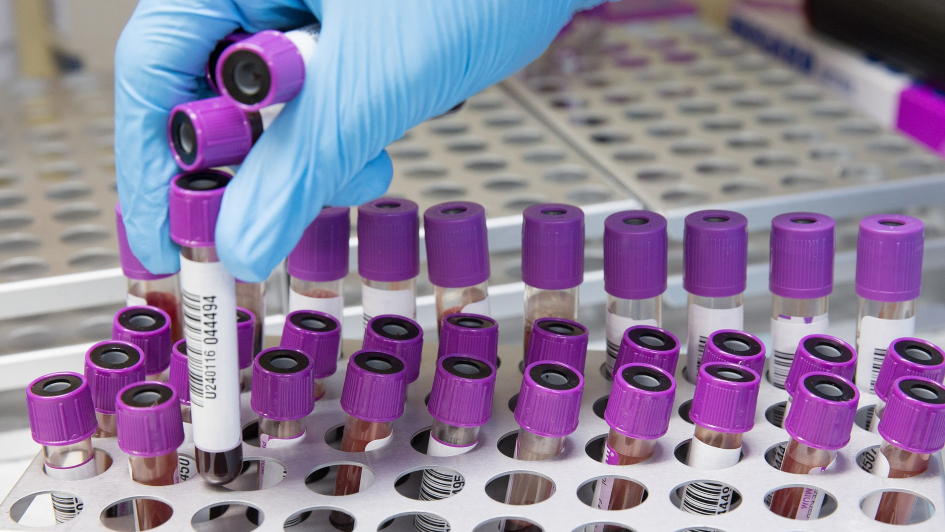
Image: Blood samples. Credit: Ahmad Ardity, Pixabay
New research has identified why some advanced oestrogen receptor (ER) positive breast cancers become resistant to hormone therapy, and has identified drugs currently in development that could keep disease stable for longer for these patients.
A team of scientists at The Institute of Cancer Research, London, found that for four per cent of patients, mutations in the oestrogen receptor gene (ESR1) called F404, when combined with specific pre-existing mutations, caused overt resistance to fulvestrant hormone therapy.
They also found that cells with these mutations remained sensitive to a range of compounds which are currently being tested in clinical trials. The researchers hope that in the future, if these new drugs are approved, patients likely to develop treatment resistance through F404 mutations could be identified with a blood test and offered new, alternative treatments.
Fulvestrant is a widely used type of hormone therapy that's usually given to people with ER-positive breast cancer, either as a first line of treatment or once other drugs have stopped working. However, patients’ cancers will very often develop resistance to the treatment over time.
The research, which was published in the journal Cancer Discovery and funded by Breast Cancer Now, Cancer Research UK, and the National Institute of Health and Care Research (NIHR), involved studying blood samples donated by people taking part in the plasmaMATCH clinical trial.
In the plasmaMATCH clinical trial, managed by the Clinical Trials and Statistics Unit at The Institute of Cancer Research (ICR), researchers are using blood tests – also called liquid biopsies – to analyse small traces of cancer DNA in the blood which have been released from tumour cells.
Using blood tests to study cancer
The team, working in the Breast Cancer Now Toby Robins Research Centre at the ICR, analysed these blood samples, looking at genetic mutations in the circulating tumour DNA of patients with advanced ER-positive breast cancer and observing how they responded to fulvestrant.
ER-positive breast cancers use oestrogen in the body to help them to grow, and hormone therapies like fulvestrant target the oestrogen receptor to prevent this.
Researchers in this study wanted to understand how mutations in the gene that codes for the oestrogen receptor, ESR1, can contribute to fulvestrant resistance.
They found that in four per cent of patients, following fulvestrant treatment, their breast cancer developed specific mutations in the ESR1 gene, called F404. These new mutations only occurred in patients who already had certain existing mutations in the ESR1 gene before treatment. The researchers noted that the combined effect of these pre-existing and new mutations was a profound resistance to fulvestrant.
Searching for alternative treatments
The team then tested a series of hormone therapies currently in clinical development on cancer cells with the F404 mutations. They were encouraged to discover that fulvestrant-resistant cancer cells with F404 mutations were sensitive to all four therapies tested.
Professor Nicholas Turner, Professor of Molecular Oncology at The Institute of Cancer Research, London, and Consultant Medical Oncologist at The Royal Marsden NHS Foundation Trust, said:
“Our study makes use of innovative blood tests which detect genetic changes present in a patient’s cancer, without the need for any invasive procedures. The discovery of these specific genetic changes in oestrogen receptor positive breast cancer helps to explain one mechanism by which some patients develop resistance to fulvestrant, and which upcoming treatments will be likely to work instead. This could revolutionise the way we treat breast cancer, by making use of these simple blood tests to match patients to alternative treatments, bringing them the best possible outcome.”
Dr Kotryna Temicinaite, Head of Research Communication and Engagement at Breast Cancer Now, said:
“These findings help us understand how secondary breast cancer can become resistant to hormone therapies like fulvestrant and what other treatments we could use in the future if this resistance happens. With an estimated 61,000 people living with secondary breast cancer in the UK, research like this is vital”.
Dr Nisharnthi Duggan, Science Engagement Manager at Cancer Research UK, said:
“Research discoveries like this help scientists find better ways to treat cancer. Understanding why a drug like fulvestrant stops being effective will help researchers and doctors identify the best medicines available for people living with certain types of breast cancer and develop new therapies. This would provide people living with specific types of cancer with more effective treatment options, ultimately helping them to live longer, better lives.”